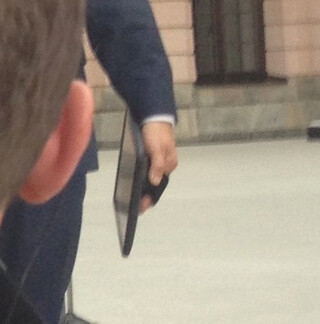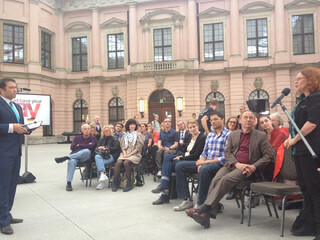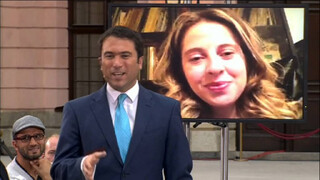“world have your say” in berlin

i was invited as an audience member for BBC world news’ world have your say (WHYS) broadcast which was sent live from 12:00 to 13:00 GMT, which is confusingly 14:00 to 15:00 berlin time¹. the audience drippled in from around 12:30 (german time) until close to the beginning of the broadcast. probably because nobody was told ahead of time, that rehearsals were planned to start around 12:30. at least i wasn’t told before.
and of course, everybody must have heard that, making television involves a lot of waiting. or as the moderator ros atkins put it during the rehearsal: »now you get a glimpse of how much work it takes, to make something look normal on TV.« when i twittered this image during the rehearsal, i learned that my iphone tries to auto correct »atkins« to »stalin«. i hope iOS does that only when you put it into german language mode.
i really liked how ros atkins conducted the audience during the broadcast. watching TV, watching the finished product almost always makes me feel being a moderator or presenter is like a piece of cake. everything seems to be quite natural on TV, even the most ridiculous set.

but being present on the set and seeing what has to be taken into account, how many loose ends have to be tied together to make it a pleasant expierience for the viewer is kind of awe-striking. it doesn’t feel natural talking into a camera, standing in the middle of a room full of people you hardly know that stare at you, having someone talking into your earpiece while you talk and listen or read on an ipad that is strapped to your hand.
again, i liked how ros atkins presented and moderated the discussion. if you haven’t seen it, in a couple of days it will be on youtube. thats at least what ros promised. and he really seems to be a sincere guy, here it is:
ros atkins and i met once before to film some scraps of a converation about germany which were used to put together a teaser for the broadcast. the teaser was send at least once on BBC world news before the broadcast. i got 8 seconds of speaking time (see the whole clip or a still-image) after waiting an hour for the team and chatting half an hour with ros. which was a pleasure and worth the while for 8 seconds of world-wide fame.

i was seated in one of the front rows, which i found kind of flattering. sitting there, ros asked me one of the more annoying questions he already asked me on monday. he asked if there hasn’t passed enough time since world war 2 for germany, so that it could return to a normal role in foreign policy. i didn’t say all of this, but i was wondering what a »normal« role would look like. and i also do hope, that even if a very long time passes, that germany won’t return to a foreign policy that wants to »punish« people or foreign governments. i was actually quite upset by a remark by german zeit newspaper journalist mariam lau, who said that she was »ashamed« of the german government, that didn’t sign a syria-resolution on the same day as other european governments and that »we« had to punish the syrian government. i really don’t know how »punishing« syria with military action (probably meaning massive airstrikes) would help anyone, let alone the syrian people, who would flee the country in large numbers. as far as i know (correct me if i’m wrong) there haven’t been any airstrikes that successfully removed a brutal regime in the last couple of centuries. and don’t say hiroshima and nagasaki, which took a huge count of civilian lives and that i wouldn’t dare to call »airstrikes«.
so however that punishment would look like, i have no clue how that would help anybody, except for the warm feeling that you get if you can say: »look, at least we did something and didn’t just sit around.« in germany we like to call that shopping-window politics. so if »normal« foreign policy means that, then i’d say, no thank you, i’m not convinced.

what i really liked about the programme was the diversity of the audience. that was a really good job by the WHYS team. people of color, germans with roots in other countries, conservatives, liberals, a politician, professors, experts on economy and me. may be the number of journalists was a little to high, but at least the political corners were balanced. may be they shouldn’t have balanced it as far as they did and even invite a journalist from the »bild«-newspaper. at least i got a chance to object to him (didn’t get his name). he tried to make a point that any economic government intervention or economic development scheme is bad. because journalists from »bild« believe (or want to believe) that the government is incapable of doing things right. except, of course, if it’s about protecting newspapers from competition (see »leistungsschutzrecht« (looked it up: ancillary copyright law) or depublicising content from public TV) or if it’s about intelligence services. these issue, says the »bild«-newspaper, are handled and excecuted perfecty by the government. i was wondering aloud if they also think that german streets and autobahns would be better managed in private hands. so i tried to make my last point and say, that i believe that the government should invest much more in infrastructure or at least stimulate massive development of the german infrastructure. especially concerning the internet, but also railroads and energy production.
i really liked the discussion, especially because there were almost no politicians present. i would really like german TV to pick up on that kind of discussion. normal people discussing on live TV with a little help of a moderator. i am dreadfully bored by german talkshows, but enjoyed »world have your say« a lot. by the way, i was also amazed how many germans speak english in a pleasant way. and i was appalled by how i struggled with the language. if i watch american TV shows i almost feel like a native speaker. so i had to learn, what a big difference there is between listening to english and actually talking english. let alone writing.
1) englisch? ich finde das ausnahmsweise mal angemessen. und weil ich beim englisch schreiben auch mal in einem wörterbuch nachschlagen kann, fluppt das worte-finden auch hoffentlich etwas besser als eben im fernsehen.
[nachtrag 13.09.2013]
das dradio über die sendung am mittwoch, auf deutsch: „Der Blick der Anderen“ (via @BBCRosAtkins)
[nachtrag 14.09.2013]
youtube-video oben eingebettet.
